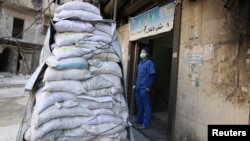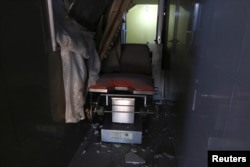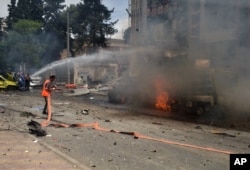Top United Nations aid officials warned Monday that health care services in Syria have been devastated by bombings and the nearly six-year-old conflict.
"Over half the country's public hospitals and primary health care centers are either closed or only partially functioning," the World Health Organization's representative in Syria, Elizabeth Hoff, told a meeting of the U.N. Security Council via a video link from Damascus.
"Almost two-thirds of all health professionals have left the country; domestic production of medicines has dropped by two-thirds and vaccination coverage rates have dropped by half," she said.
Hospitals, clinics are targets
The result is that many Syrians are dying of preventable diseases, not just war injuries. Hospitals and clinics have also become a prime target of government and Russian warplanes.
Hoff said that in the first nine months of this year, there were 126 such attacks. Just this month, 11 hospitals were attacked in Aleppo, Idlib and Hama governorates — some more than once.
"Many patients are simply too afraid to travel to hospitals or clinics because they fear attacks, detention or abuse," Hoff reported.
"As of yesterday, there are barely any functional hospitals left in eastern Aleppo able to treat those who have escaped death, as all the hospitals are being bombed into oblivion," U.N. humanitarian chief Stephen O'Brien said.
Since July, eastern Aleppo has been the focal point of a massive military air offensive by the Assad regime backed by Russia. After a few weeks of relative calm, intensive bombing began again last Tuesday.
"Let me be clear," an angry O'Brien told the council. "This is not business as usual. What has been unleashed on civilians this past week is yet another low in an unrelenting inhuman onslaught."
Food stocks are gone
Some 275,000 civilians are under siege by government forces in opposition-held eastern Aleppo. On November 13, the last food stocks that the World Food Program had in that part of the city ran out. The government has not allowed aid workers into the east of the city since July. Medical supplies are also dangerously low.
O'Brien said residents there will soon face a "harsh winter without heating or the bare essentials for life."
They are not the only ones who will be suffering. O'Brien said the number of Syrians living in "besieged" parts of the country have nearly doubled over the past six months from 486,700 to nearly one million.
Accountability
"Russia and the Assad regime's merciless attacks must end," U.S. Ambassador Samantha Power told the council. "And those behind such attacks must know that we and the international community are watching their actions, documenting their abuses, and one day they will be held accountable."
She proceeded to name five Syrian commanders who she says Washington believes have been involved in military assaults on cities, residential areas and civilian infrastructure that could amount to war crimes.
"Now I know right now, today, with wind at their backs, these individuals feel impunity," Power said. "So, though, did Slobodan Milosevic, Charles Taylor, and countless war criminals before them. Today's atrocities are well-documented, and the civilized world's memories are long."
The American envoy also read out the identifying numbers of four Syrian military intelligence branches, an Air Force intelligence investigation branch, Sednaya prison, and the Tishreen and Harasta military hospitals, where she said torture has taken place and continues to take place.
She said the international community would be watching the officers who command those locations as well, and that they would also "one day be held accountable."
Russian skepticism
Russia's envoy, Deputy Ambassador Vladimir Safronkov, questioned the veracity of U.N. data on numbers of besieged Syrians.
"The purpose of such mathematical contortions is obvious. It is trying to present the government of Syria as the main party responsible for the suffering," Safronkov said. "If this is the case, it's an unacceptable approach."
He said it is not clear how the U.N. makes its calculations, as fighters do not allow the U.N. on their territory. He also criticized the U.N. for under-reporting the number of Syrians in government-controlled areas who are in need of humanitarian assistance.
Regarding attacks on eastern Aleppo, Safronkov said that since October 18, Russian war planes have not conducted airstrikes over Aleppo or within 10 kilometers around it.






